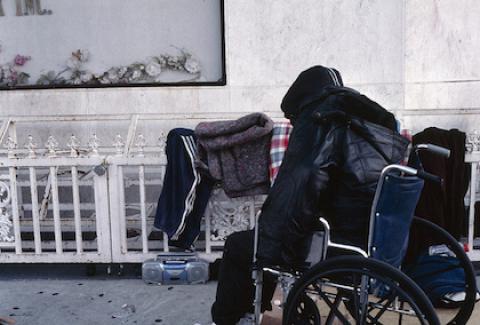Chronic homelessness is such a daunting problem in Los Angeles County that even after 10,000 people were moved into housing in the last three years, about 13,000 people on public assistance slip into homelessness every month, a new study has revealed.
The number of people who become chronically homeless overwhelms the dwindling supply of affordable housing, according to a report released today by the Economic Roundtable, a research organization based in Los Angeles.
“Ending chronic homelessness will be feasible if fewer people become homeless,” said Daniel Flaming, author of the report. “This requires the combined resources of health, mental health, social service, education, justice system and housing agencies to restore a place in the community for homeless individuals.”
The report, titled “All Alone,” said there is not enough help for children and young adults at risk of homelessness. It estimates that 42 percent of people who experience homelessness do not receive the help they need to become housed. Half of all homeless public assistance recipients are children. The report concludes that providing help for children and young adults is crucial “to reduce the feeder pipeline from childhood poverty and homelessness into adult chronic homelessness.”
The report recommends that public assistance programs start flagging “tripwire events” that lead to homelessness – from children not attending school regularly and long-term unemployment of parents to domestic violence – and connect them to agencies that can help them quickly.
The analysis looked at records of 9 million county residents on public assistance at any time between 2002 and 2010.
Susie Shannon, executive director of the non-profit Poverty Matters, is not shocked by the high numbers. “Our recent homeless count showed a 12 percent increase (44,000 people) in homelessness both in Los Angeles County and the city of Los Angeles,” she said.
The most urgent intervention, she says, is financial. “The answer to keeping someone in their home is rental assistance,” she said.
Shannon says the report should have focused more on the dire need for affordable housing and the bureaucratic barriers to getting it. The wait in Los Angeles County for Section 8 federal housing vouchers was 10 years in 1999, and the waiting list closed in 2004, the report noted.
When applicants are issued federal vouchers for low-income housing, they may not be able to receive it without a home address. Homeless can’t get a post office box because the U.S. Postal Service requires a physical address. “The housing authority sends you a letter, but if you are living in your car or living on the street, you can’t get it,” Shannon said.
Some homeless advocates are turning to experts in Utah who managed to reduce chronic homelessness by 91 percent. “Next month, we’re bringing out the architects of that plan,” Shannon said. “Everyone who is chronically homeless, they gave them homes.”
[Haya El Nasser @hayaelna is a Digital Reporter for Al Jazeera America in Los Angeles.]


Spread the word